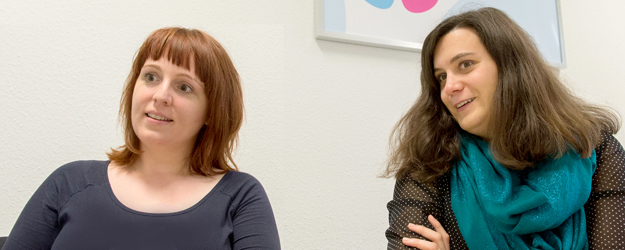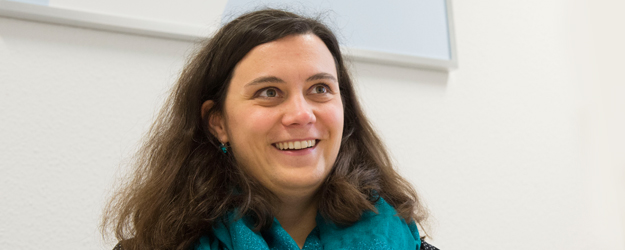18 December 2014
Looking for a daycare facility for your child? Pregnancy getting in the way of your studies? You have a relative who needs care? In situations like these the Family Services Center at Johannes Gutenberg University Mainz (JGU) is there to help. Stefanie Schmidberger provides advice to students and university employees who, for example, are having problems dealing with the authorities or finding the support services they need. She knows the sort of difficulties people can encounter, knows a way through the tangle of regulations, and can provide valuable aid and assistance.
Tiberius wastes no time in making quite clear what his particular interest is. "Train," beams the two-year-old. "Station, train, train," he goes on. He inspects the unfamiliar surroundings. Stefanie Schmidberger's office has a corner with a children's table, small chairs, painting equipment, and picture books, but what has principally caught Tiberius' eye are two large upholstered chairs. "Blue," he ventures. Schmidberger corrects him: "No, that's not blue, that's purple." Adults can be so cruel. Surely 'blue' is close enough. But Tiberius is undaunted: "Purple? Purple!" Then he returns once again to his principal concern: "Train, train, station."
Some three years ago, Tiberius' mother, Jessica Paczka, sat in this room in one of the purple chairs for the first time. She had just found out that she was pregnant. "I had no idea what on earth to do next, who I should turn to?" So she came to the Family Services Center at JGU. "We first talked about the maternity allowance," Schmidberger recalls. "Students who are also holding a job often have trouble with a lot of the health insurance providers." The job center also created problems. "There is a whole tangled thicket of complications out there that you need to hack your way through," says Schmidberger.
200 consultations a year
The Family Services Center has been dealing with cases like Jessica's and many others since 2011. "We used to be part of the Office of Gender Affairs and Equal Opportunity," explains Schmidberger, who once worked there. But attaching the label 'Gender Affairs' to what are really family issues did not seem quite right. After all, the problems discussed here also relate to children and senior citizens and men. All employees and students at Mainz University were to have a single location where they could go to get help when they have children or family members in need of care.
Schmidberger conducts about 200 consultations a year. "And that's not counting all the e-mail queries and phone calls I get where I can just quickly fire off a bit of advice." One of her main problems is finding places for children in daycare facilities. By now, almost everyone in Germany must be aware that the current situation leaves much to be desired. There are simply not enough facilities and not enough preschool teachers, and Mainz is no exception in this regard.
"The university can provide 240 to 260 places in preschools and creches," states Schmidberger, sketching out the situation on campus. The university has its Campulino daycare center operated by the Mainz Student Union, while there is also the municipal day care center on campus. Of course, most parents would prefer a place for their child near where they live. But whatever their needs, they can count on the support of the Family Services Center.
Tiberius in temporary care
Paczka came by when she could not find anything for Tiberius in the center of town. Unfortunately Schmidberger could not offer her a place in a kindergarten either, but she did have another solution available: temporary care. "Parents can bring their children there for two to three days a week and they will also supervise them in emergencies. We just need to be informed the evening beforehand."
The temporary care is provided by pme Familiensservice GmbH and their services are procured by JGU. "There are several institutions and businesses in the city that do the same," explains Schmidberger. Employees are charged EUR 25 a day, students have to pay EUR 15. The university pays the rest.
"Temporary care may sound stopgap," says Paczka, "but it is much more than that. There are well qualified personnel who look after Tiberius there and he enjoys it." "Station," babbles Tiberius in apparent confirmation. Unable to find any trains, he has in the meantime discovered the three wooden cars on Schmidberger's desk.
The temporary care option has been well received, very well indeed. "In fact, we've just increased the available budget," says Schmidberger, whose work here involves a great deal more.
The personal matter of having children
She helps when study and family come into conflict. "In some of our faculties those responsible are really supportive so that things go well there. But then there still are some hard-boiled cases who refuse to accept that children are any concern of the university. They see it as an entirely personal matter, something that those involved will need to deal with on their own."
Schmidberger, not surprisingly, sees things differently: "Surely it is important not to ignore the fact that a university must be attractive for students, teaching staff, and researchers alike." In effect, this means that a university should provide specific services and must be prepared to respond to certain needs. She has already managed to negotiate flexible attendance requirements for female students during their pregnancy and in the first few months of motherhood. "There are many ways to make up for this, such as writing a longer seminar paper instead. Many students in this situation volunteer to do so."
She also helps find placements for the children of newly appointed professors. "What I have particularly noticed is that the level of expectations varies with country of origin and culture. We are still streets behind in comparison with the Nordic countries. But we catch up."
Caring for family members
The help provided by the Family Services Center is not limited to its existing services. Schmidberger also keeps an eye open for what else might be needed. She is working on new concepts and is considering what direction the Family Services Center should take. "For example, we have nothing on offer with regard to after-school supervision of school-age children." Something needs to be done there she thinks.
And the issue of relatives in need of nursing care is not given the attention Schmidberger thinks it deserves. "Most people with a problem of this nature in the family hesitate to draw attention to it and are averse to asking for help." However, there are a couple of solutions that the JGU Family Services Center can offer.
Tiberius cheerily stacks the wooden cars on top of each other. He only looks discouraged when the stack collapses noisily. The day care and kindergarten places at JGU will be assigned in January. Perhaps Tiberius and his parents will get lucky. Whatever the outcome, they still have the temporary care to fall back on. "He is well taken care of there," emphasizes Paczka. "Station," avers Tiberius as he returns to piling up the wooden cars.



